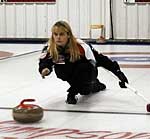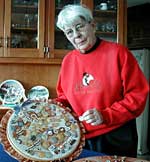In Bemidji, curling is queen
By Tom Robertson
Minnesota Public Radio
January 31, 2002
|
| RealAudio |
If there is a curling capital in Minnesota, it may well be the city of Bemidji. The winter sport took hold there in the 1930s, and the community has embraced it ever since. In the past two decades, Bemidji has produced 20 national championship teams. This year, two Bemidji sisters - coached by their dad - will compete in Salt Lake City for Olympic gold.
| |
|
|
|
||
Kari Erickson and her sister Stacey Liapis have been hanging out at the Bemidji Curling Club since they were toddlers. On this night, they're guests of honor at a community send-off. Liapis, who now lives in Chicago, says it's just starting to hit her that she and Kari are Olympic athletes.
"When we get closer to the Olympics, there's more things that we're doing, the TV and the radio shows and stuff like that. But we're finally saying, 'You know what? I think we're going to the Olympics,'" says Liapis.
The sisters have been curling competitively since 1988. They're guided by their father, Mike Liapis, who last year was named USA Curling Coach of the Year.
"It's phenomenal," says Mike Liapis. "I spent the last 10 years with the girls in hopes that this might become a real thing for them. It's really something special, something you really think would never happen."
The Kari Erickson Rink - so named because Kari is the "skip," or leader of the team - also includes Debbie McCormick of Madison, Wis. and Ann Swisshelm of Chicago. Ed Lukowich, athlete development director for the USA Curling Association, says the squad's level of play has steadily improved.
| |
|
|
|
||
"They're a team that has an excellent chance of winning the gold medal in Salt Lake, and even some world championships after that, eh? Because they're finally getting to that world level," Lukowich says.
Curling developed in 16th century Scotland, but this will be only its second appearance as an Olympic medal sport. There are only about 15,000 curlers in the U.S. Nearly half live in Minnesota and Wisconsin. The game is played on a 146 ft. long by 15 ft. wide sheet of ice. Players push a 42 lb. granite stone down the ice. Teammates use brooms to sweep the stone's path to make it go farther. Points are scored by placing the stones closest to the center of the target.
Retired Bemidji State University professor Ruth Howe taught curling at BSU and wrote a textbook on the game.
"Some people have described it as shuffleboard on ice, or some say it looks a little bit like bowling on ice. But there's no comparison there to any of them. It's so unique and should stand by itself," she says.
Howe says curling in Bemidji has traditionally been a family affair. It's popular, in part, because kids are introduced to the sport in school. Some 230 students take curling each year at Bemidji High School.
| |
|
|
|
||
"It's just a natural that they would breed competent, competitive curlers. The sport itself perpetuates curling. And once you get hooked, you're hooked. And that's all there is to it," says Howe.
With her Olympic teammates all living outside Minnesota, Kari Erickson often practices alone. She says it gives her time to really concentrate and work on placing her stones. Erickson, 30, is a swimming instructor and part-time Target employee. She left competitive curling in 1998 to have a baby, and didn't plan on coming back.
"I guess it's a sport that's really hard to leave," says Erickson. "It kind of gets in your blood and it's hard to say goodbye to it. And it's a sport where you are able to have a family. You don't have to move away and train full time every day for a month."
Erickson apologizes for maybe sounding hokey, but she says going to the Olympics is a dream come true.
"We've always said we wanted to make the Olympics. We knew if we worked hard we would have a chance at it," she says. "But now that it's there, it seems almost too good to be true."
The Kari Erickson Rink will face teams from nine nations when the Olympics get underway Feb. 8.
More Information


